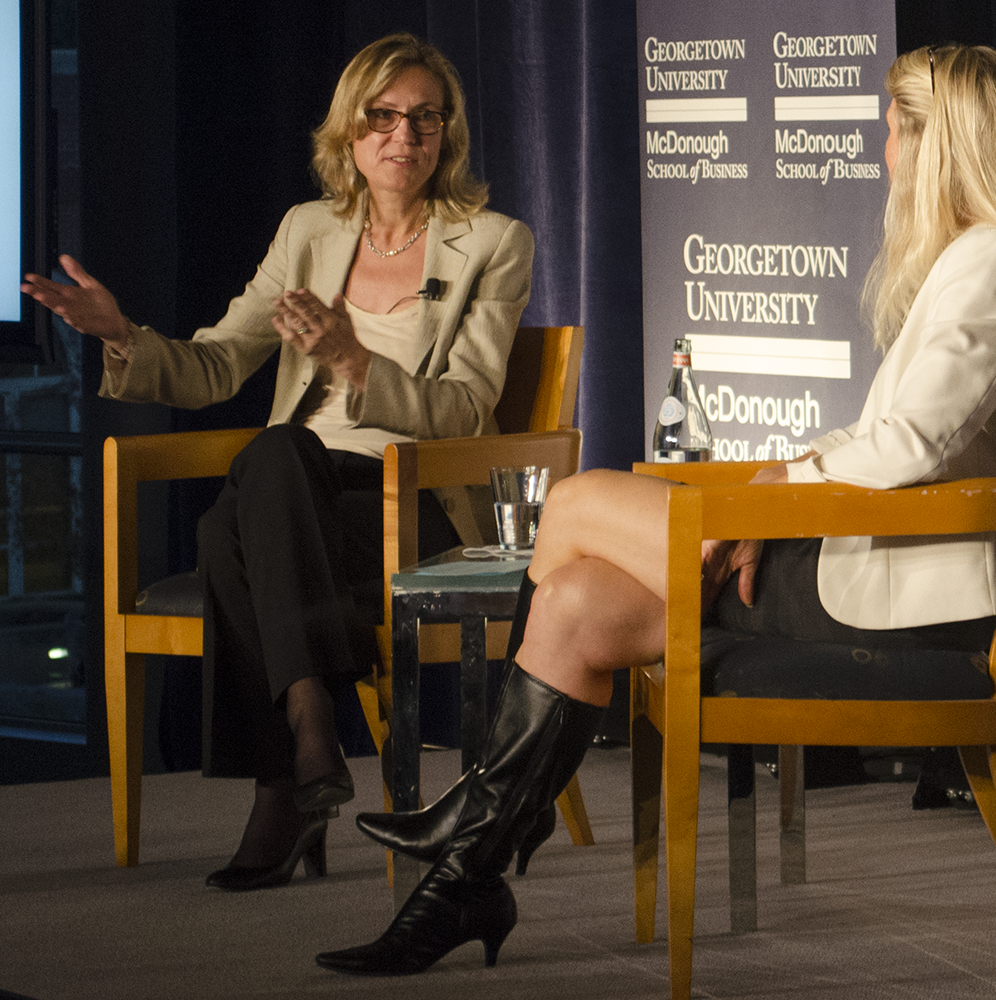
President of the BBC Worldwide North America Ann Sarnoff (GSB ’83) discussed the future of television at an event Thursday.
BBC Worldwide North America President Ann Sarnoff (GSB ’83) emphasized the importance of reimagining content in an era of mass media consumption at the Fisher Colloquium in the Rafik B. Hariri Building on Thursday.
The Georgetown University Women’s Leadership Institute organized the event, titled “The Evolution of Television.” GUWLI Director Catherine Tinsley moderated the discussion. GUWLI, which was founded in 2003, is a joint initiative between the Office of the President and the McDonough School of Business dedicated to empowering female leaders in the business sector through scientific insight and data-driven knowledge.
Sarnoff, who previously worked for Nickelodeon and Dow Jones, is known for bringing an entrepreneurial and innovative spirit into the workplace. She was responsible for large marketing and sales projects that diversified the BBC’s content department and currently works to address the future of television and content consumption.
Sarnoff said that her goal at the BBC is to address millennials and the way they are constantly redefining the concept of television and media.
“Millennials are the cord-cutters because they grew up on the Internet, watching things on their computers and on smartphones,” Sarnoff said. “The state of television is in a very exciting state of flux because at companies such as BBC, we are content creators.”
According to Sarnoff, this reimagining of television is indicative of the growing power of companies such as Netflix, Hulu and Amazon, especially as major television providers have begun selling their shows directly to these sites as a form of direct release.
Referring to this growth in the quantity and means of distribution of television, Sarnoff acknowledged the importance of consumer choice and demand in an age in which consumers have increasing liberty to change content providers quickly.
“A lot of British programming … is high quality, and we feel very confident that as television continues to evolve on multiple platforms, [BBC content] will rise to the top,” Sarnoff said. “But all consumers now have ultimate choice to choose what to watch when you want it, on demand. … Consumers don’t like to wait for anything.”
With the amount of choice modern-day consumers now have, Sarnoff said that there is a new emphasis on being first to market with higher-quality products.
“[Consumers] want more exclusive programming that you won’t see on any other service,” Sarnoff said. “Netflix is a prime example of this trend. … This changes our economics as content providers because now we have a different way to monetize shows. Not only can we sell to traditional cable and network providers, but also these services for first windows.”
Another key point of the conversation was the progress of content consumption in developing countries. According to Sarnoff, the evolution of television has not been equal in all countries as states often lack the infrastructure to adapt to data-intensive television practices.
Sarnoff said content producers are still seeing rapid developments in these countries, in spite of the lack of infrastructure.
“Video is very data-intensive and hard to get across networks … so it really is about the infrastructure,” Sarnoff said. “Developing countries develop the infrastructure and leapfrog the Western way of rolling out television networks, jumping straight into the on-demand content.”
Sarnoff further elaborated upon her own principles of leadership and building an efficient team. She also acknowledged creativity as the center of all innovation and progress in her industry.
“I also believe, in order to bring innovation into a culture, that you should reward failure and punish inaction,” Sarnoff said. “Celebrating and learning what we do wrong allows better decisions going forward. Through this attitude, I was able to help inspire my teams to make progress and think creatively.”
William Treanor (COL ’19) said he appreciated Sarnoff’s insights on both the television market and the role creativity plays in her leadership.
“It was incredibly interesting to see how the shows we watch on TV or Netflix represent such a small fraction of the worldwide market and reflects the decisions made by a small group of individuals,” Treanor said.
Joseph Stabile (SFS ’19) said that Sarnoff offered a unique perspective on the issue of content consumption as a female media executive.
“I found it really interesting to hear her position on the evolution of television as technology advances [and] her insights as a woman in a high-ranking business position,” Stabile said.




















